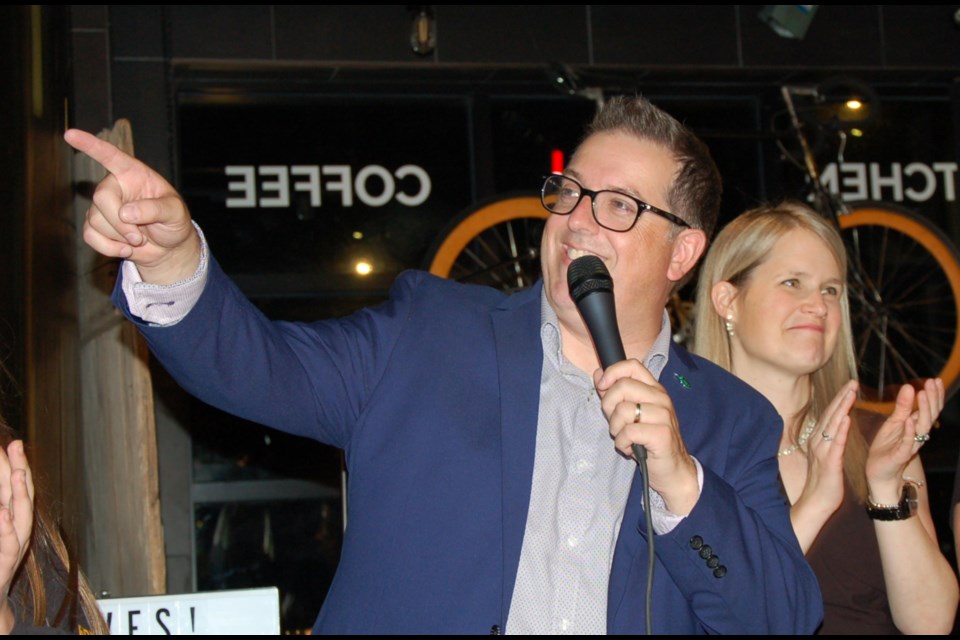Cam Guthrie was returned to the mayor’s chair for a third straight term on Monday, coming out well ahead of five challengers.
“I ran a campaign that obviously really resonated with the community,” said Guthrie, who gathered with supporters at Fixed Gear Brewing as results came in. He led a campaign that focused on housing, affordability and safety. “Those are the three main things. I intend to follow through on that, with the support of council.
“Clearly the community said that’s exactly what they want.”
Unofficial results show Guthrie received 20,357 votes, about 71 per cent of ballots cast in the mayoral race.
Joining Guthrie for the next term of council are Dan Gibson and Erin Caton in Ward 1, Rodrigo Goller and Carley Klassen in Ward 2, Phil Allt and Michele Richardson in Ward 3, Christine Billings and Linda Busuttil in Ward 4, Leanne Piper Caron and Cathy Downer in Ward 5 and Dominique O’Rourke and Ken Yee Chew in Ward 6.
The lone councillor voted out of office was Ward 6's Mark MacKinnon.
The next term of council will be officially sworn-in during a Nov. 15 ceremony at city hall.
Guthrie was first elected mayor in 2014, when his 19,642 votes bested incumbent Karen Farbridge’s 14,147. There were five others on the ballot as well, though they came in far behind in the vote count.
Guthrie retained his seat during the 2018 election, capturing 22,203 votes to sole competitor Aggie Mlynarz’s 11,149.
Prior to being elected mayor, Guthrie represented Ward 4 as councillor for a term.
The incumbent was in the lead throughout Monday evening as results came in.
Guthrie’s closest challenger this time around was Danny Drew who garnered 3,659 votes (12.8 per cent).
"This is the beginning. I campaigned on putting renters before developers, people before profit. It's a victory for all Guelph residents that half of all elected councillors accepted my vacancy tax challenge and give full or qualified support for a vacancy tax," said Drew in a news release. "A vacancy tax is a win-win-win: more homes, lower rents, more revenue for the city. It's high time for Guelph to join Toronto, Ottawa, and Windsor in putting people's needs ahead of speculators' greed.
"I will continue to campaign with supporters for not only better housing but also free transit and the other planks in my platform. I thank all the voters who voted for change and everyone who put their name forward to be a candidate to make a difference.”
Also running were William Albabish, Shelagh McFarlane, John Edward Krusky and Nicholas A. Ross.
“I want to say big congratulations to all of the candidates that had the courage to put their name on the ballot. I know what it’s like to have that decision-making process,” Guthrie said. “To put your name on a ballot, to let your name stand, then to go through a grueling campaign, to have the results either go your way or not, every single one of the candidates deserves a huge round of applause for the democracy in our city.”
Less than 28 per cent of eligible voters cast a ballot in the election.
Voter turnout in the 2018 municipal election was about 37 per cent, down about six per cent from the 2014 election.
Six days of advanced voting earlier this month saw more than 7,300 voters cast their ballot in the city. That figure, which includes some mail-in ballots, accounts for about seven per cent of eligible voters.
Heading into Monday there were about 105,000 eligible voters in the city, clerk Stephen O'Brien previously told GuelphToday, noting that number would likely fluctuate as the election progressed due to people missing from the voters list and the potential inclusion of some who no longer live in the city.
